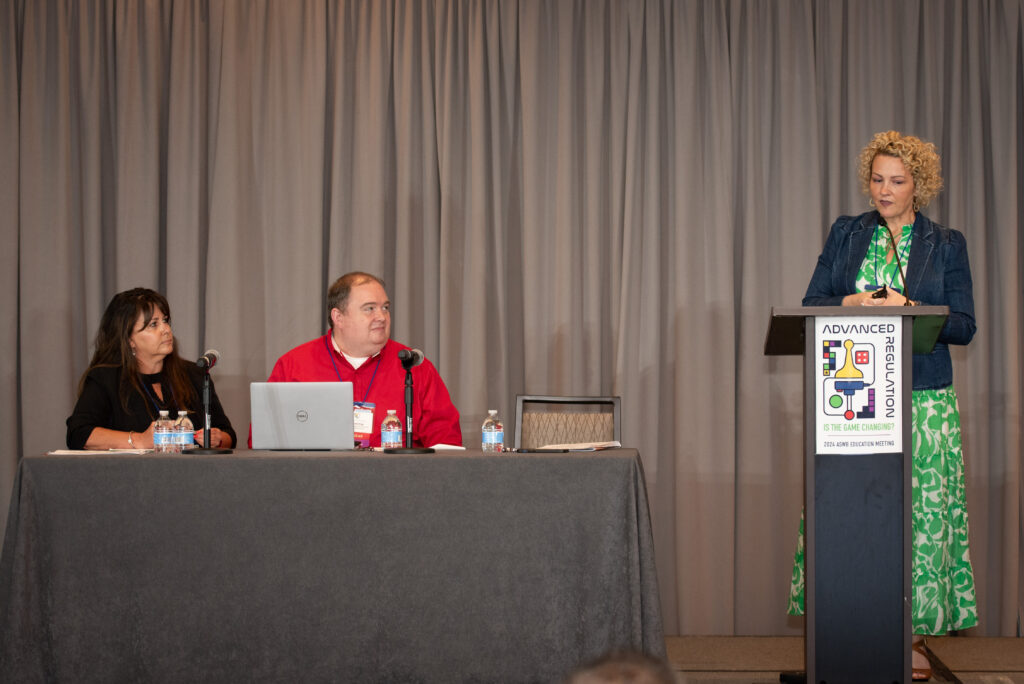The evolution of clinical supervision in social work regulation
As social workers navigate the changing landscape of the profession, many structural, ethical, and legal questions arise. Supervision is at the heart of many concerns in areas as diverse as supervisor availability, qualifications, and performance. All these factors affect candidates for licensure and ultimately, the general public.
 A panel of regulators shared their supervision insights at the ASWB Education Meeting earlier this month in Arlington, Virginia. Panelists included David B Fye, JD, Executive Director, Kansas Behavioral Sciences Regulatory Board; Yvette Gosline, CMSW, Chair, North Carolina Certification and Licensure Board; and Tobi Zavala, Executive Director, Arizona Board of Behavioral Health Examiners.
A panel of regulators shared their supervision insights at the ASWB Education Meeting earlier this month in Arlington, Virginia. Panelists included David B Fye, JD, Executive Director, Kansas Behavioral Sciences Regulatory Board; Yvette Gosline, CMSW, Chair, North Carolina Certification and Licensure Board; and Tobi Zavala, Executive Director, Arizona Board of Behavioral Health Examiners.
“Our main challenges lie in navigating the variable terrains of jurisdictions, upgrading our strategies for quality and technology, and unifying our policies to ensure everyone achieves excellence and ethical victory,” said Gosline.
“Clinical supervision is probably one of the biggest issues that we have in Arizona due to a lack of oversight as well as some ethical behaviors that take place during clinical supervision,” said Zavala. “I remind our supervisors that they are the ones giving that independent license.”
We’re leading the way toward a future where clinical supervision and social work regulation are transformed, elevating standards and ensuring public protection.
This is further complicated by the fact that no two states have the same supervision requirements.
“Arizona also has very minimal requirements for clinical supervision, which is why we see a lot of the issues we have,” Zavala added. “The process begins with a focus on elevating the quality of clinical supervision across diverse jurisdictions and acknowledging the critical role it plays in the development of competent and ethical social workers.”
This can mean adding rules, which is often met with resistance.
Still, Zavala said, “If there is a problem in your state, you have an obligation to fix it. It’s our responsibility to protect the public through effective and ethical clinical supervision.”
Fye, whose board recently surveyed 8,000 licensees about supervision issues, shared those findings. Respondents reported several major areas of concern:
- Quality of the supervisor: the individual is uninformed, unprepared, or not fully versed in advocacy or policy. There were comments about inheriting an unsatisfactory supervisor provided by the employer and candidates opting instead to pay for their own supervision.
- Quality of the supervision: goals are unclear; practice models are not articulated; supervisors monitor hours rather than the substance of discussions.
- Capacity: supervisors are too busy to provide quality supervision, working with as many as 15 supervisees.
- Inconsistency: supervisors are constantly changing.
- Challenges with remote supervision: easier access of this modality offers greater flexibility but can come at the cost of compromising understanding and emotion.
- Ethics violations: often involving friendships or business ventures.
“There are a lot of things to be gained by listening to your licensees and putting out a survey. The licensees really appreciated the opportunity to provide feedback directly to us,” Fye said.
Gosline said that in her experience, the typical complaints are similar to those noted in Fye’s survey.
“We really need to brainstorm ways in which there could be a better collaborative effort between all jurisdictions to come up with some type of uniformity. We get together a couple of times a year. If we could put together some set of best practice guidelines to look to for guidance in this area, it might make things run much more smoothly across North America as we look to the compact for multi-state licensure,” she noted.
Zavala stated, “We must implement strategies to transform the supervision landscape, focusing on quality, ethics, and public protection. This protection must include disciplinary action on supervisors. Arizona opened 15 complaints last year on clinical supervisors; last month we opened five.” She continued, “We’re letting people know that they’re not going to be able to get away with that type of unethical behavior.”
Gosline noted that supervisees can and should take a more proactive role in understanding what they should expect from a supervisor. “If we can educate supervisees what to expect in supervision, we could avoid some of the issues that arise,” she said.
Alverta Muhammad, LSW added, “It was wonderful to get ideas about how supervision is handled in other jurisdictions.”
“Supervision should not be a drive-by role,” said ASWB CEO Stacey Hardy-Chandler, Ph.D., J.D., LCSW, PGDip. “Clinical supervision should be considered a practice area.”
- Related resources
Clinical social work supervision reports
ASWB has compiled three reports on clinical social work supervision in Canada and the United States.

